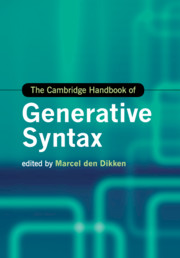Book contents
- The Cambridge Handbook of Generative Syntax
- Series page
- The Cambridge Handbook of Generative Syntax
- Copyright page
- Contents
- Contributors
- Preface
- Part I Background
- Part II Modern generative approaches to the study of sentence structure
- 4 Principles and Parameters theory and Minimalism
- 5 Minimalism and Optimality Theory
- 6 Lexical-Functional Grammar
- 7 Phrase structuregrammar
- 8 TreeAdjoining Grammar
- Part III Syntactic structures
- Part IV Syntactic processes: their nature, locality, and motivation
- Part V Syntax and the internal interfaces
- Part VI Syntax and the external interfaces
- References
- Index of language names
- Index
6 - Lexical-Functional Grammar
from Part II - Modern generative approaches to the study of sentence structure
Published online by Cambridge University Press: 05 August 2013
- The Cambridge Handbook of Generative Syntax
- Series page
- The Cambridge Handbook of Generative Syntax
- Copyright page
- Contents
- Contributors
- Preface
- Part I Background
- Part II Modern generative approaches to the study of sentence structure
- 4 Principles and Parameters theory and Minimalism
- 5 Minimalism and Optimality Theory
- 6 Lexical-Functional Grammar
- 7 Phrase structuregrammar
- 8 TreeAdjoining Grammar
- Part III Syntactic structures
- Part IV Syntactic processes: their nature, locality, and motivation
- Part V Syntax and the internal interfaces
- Part VI Syntax and the external interfaces
- References
- Index of language names
- Index
Summary
Keywords
- Type
- Chapter
- Information
- The Cambridge Handbook of Generative Syntax , pp. 162 - 201Publisher: Cambridge University PressPrint publication year: 2013
- 2
- Cited by

